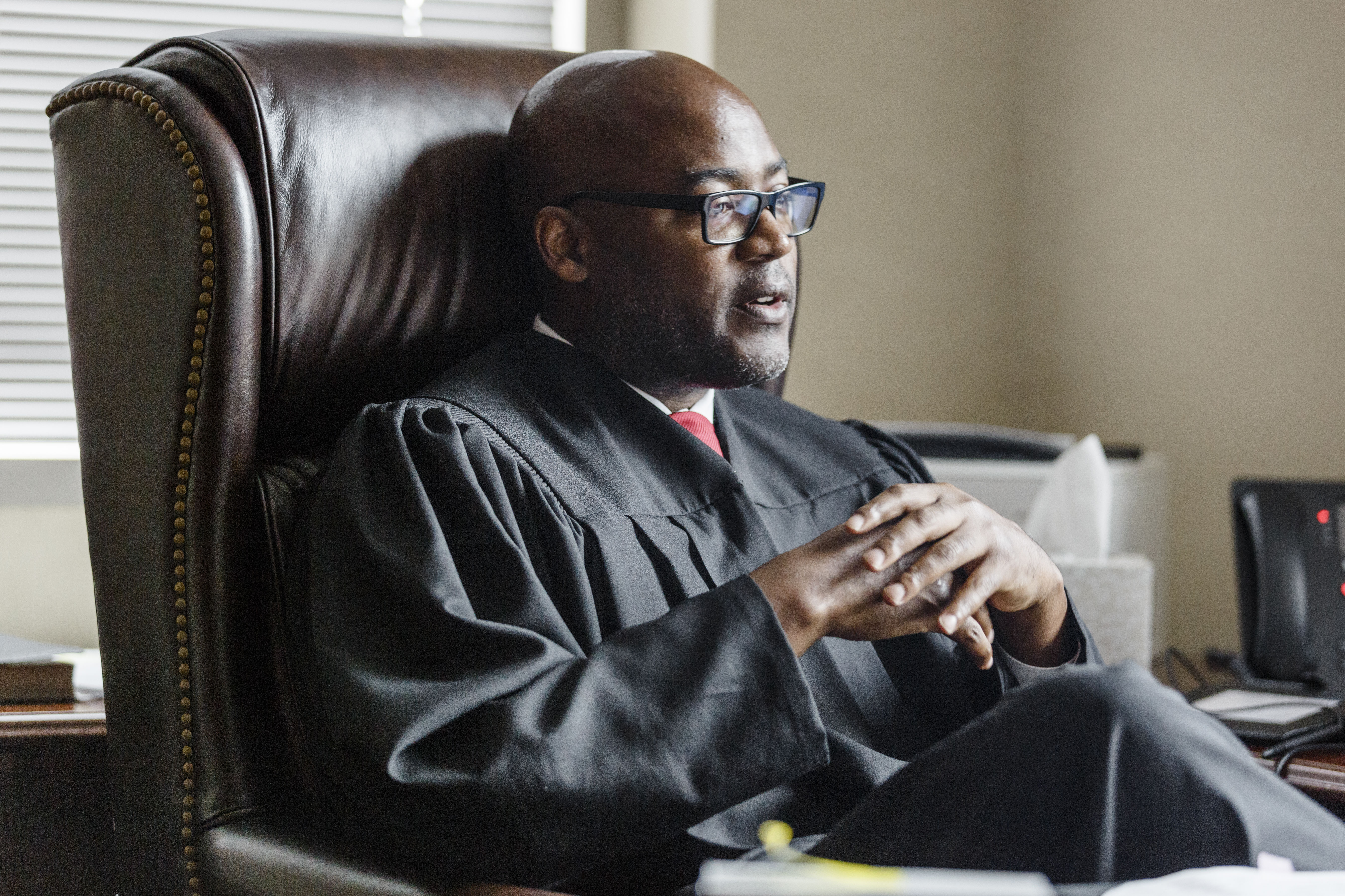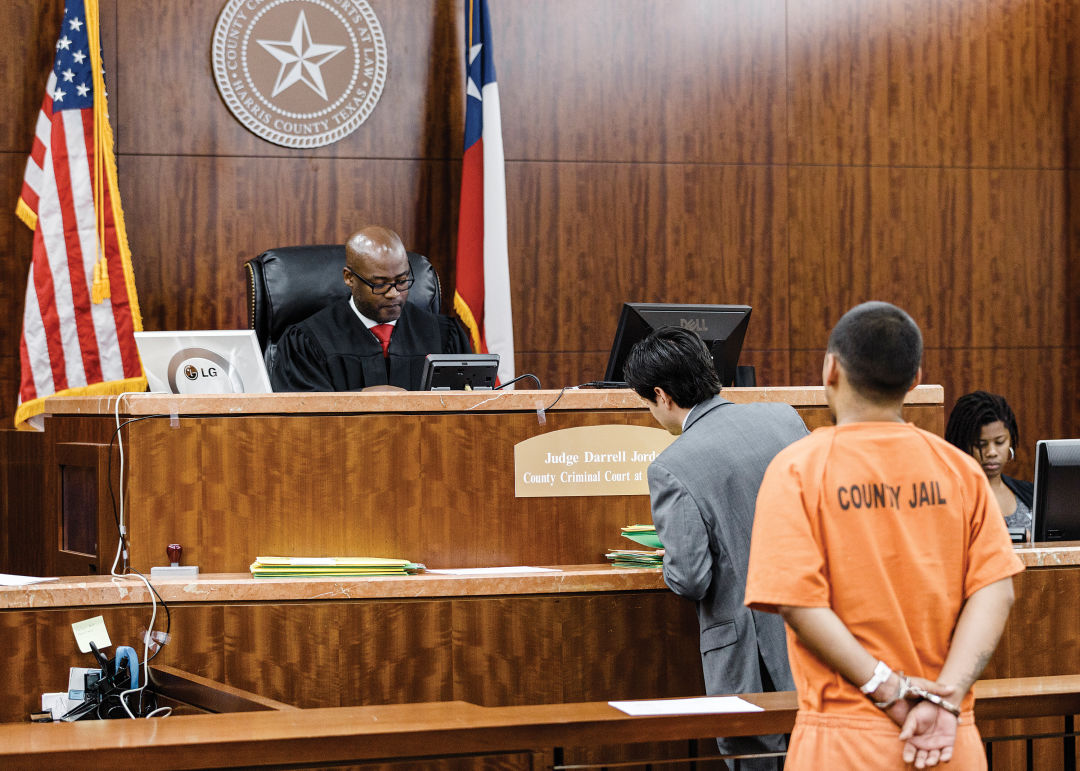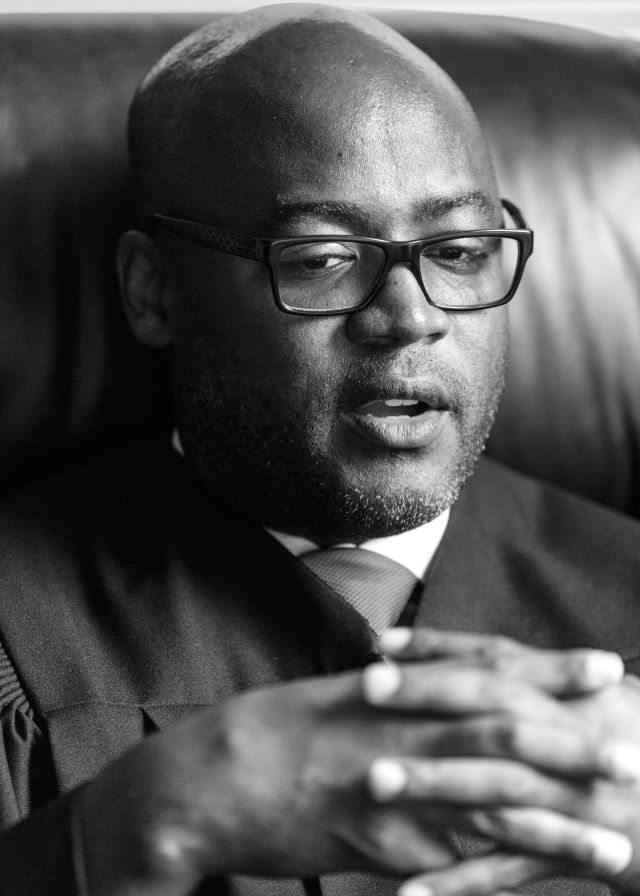
Meet the Harris County Judge Who Wants to Abolish Our Cash-Bail System
"All rise,” the bailiff calls, and the people packing the rows of Court 16 at the Harris County Criminal Court shuffle to their feet. Judge Darrell Jordan strides in, a 41-year-old man in black-framed glasses, his robes fluttering behind him before he stops abruptly in front of an American flag and begins to recite the Pledge of Allegiance.
Jordan calls out all 92 names on his early-July docket, marking attendance and asking each defendant how to correctly pronounce their names. He reminds them not to talk about their cases; that’s not what he’s here to discuss.
Each of the defendants is awaiting trial for misdemeanor crimes ranging from trespassing to DWI to theft. Although the judge won’t be seeing everyone—some will make plea deals, others will reset their court dates—he’ll bring about a dozen out, one at a time, for a face-to-face, before resetting their bail, which is his job today.
The first defendant, a skinny man in orange, is brought out. Charged with stealing several necklaces, which together cost less than $750, he has been in jail for three days. The bail set when he was admitted, according to a schedule used by the county, was $2,500. He’s still in jail, though, because he can’t afford to pay it or bond out.
“We’re going to issue a PR bond,” the judge tells the man, meaning he can walk out without paying a dime because the judge will accept his word that he’ll show up to his court date.
A law intern working with the judge pipes up, mentioning the man’s lengthy list of prior arrests and convictions.
“That’s okay,” the judge replies.
A look of surprise flashes across the defendant’s face, and he takes a second before stammering, “thank you, sir,” as the bailiff leads him back out to be processed for release.
H
arris County has a long history of setting bail higher than low-level offenders can afford to pay. It’s a practice that is currently in the national spotlight, thanks to a civil rights lawsuit against our cash-bail system, brought in May 2016 by three plaintiffs accused of misdemeanors.
The suit pairs the Texas Fair Defense Project and local law firm Susman Godfrey with the national nonprofit Civil Rights Corps—which has been successfully arguing similar cases around the country—and maintains that our cash-bail system is a violation of poor people’s rights. Its first plaintiff was Maranda O’Donnell, a 22-year-old mother who was pulled over and jailed for having an invalid driver’s license, could not pay the $2,500 bail the judge set for her, and was stuck in jail two days, putting her new job at a restaurant in jeopardy.
The suit earned a big win in federal court last April, when Chief U.S. District Judge Lee Rosenthal temporarily struck down the current system after finding that it violated the rights of low-income offenders. The judge required Harris County Sheriff Ed Gonzalez to release all misdemeanor offenders within 24 hours of arrest, regardless of their ability to pay bail.
Harris County has spent more than $2 million defending itself so far. In April, it hired Charles Cooper, an appellate attorney who’s also counseled U.S. Attorney General Jeff Sessions, for $550 an hour.
In June, U.S. Supreme Court Justice Clarence Thomas denied the county's appeal of the injunction. The case may take years to resolve, although Rebecca Bernhardt, the executive director of the Texas Fair Defense Project, says she’s hoping the county will come to the table and settle.
“They’d like to say it has a public benefit, but when you look at it in detail, you realize the Harris County system is not protecting anyone, and it’s incredibly damaging to the people in jail,” Bernhardt says. “It only takes three days in jail to create total upheaval and upend your life—that’s enough time to lose your job, have your car towed and lose your car, and in many cases to lose your home or apartment. That’s a huge amount of harm.”
Despite Rosenthal’s 24-hour-release order, the majority of defendants Judge Jordan will see that July day have been in jail for several days, most likely because they can’t make bail. The judge will release all but one, who has a felony pending, with a PR bond.
It’s an approach Jordan has been using since being elected in November 2016, six months before the federal order came along and upended a cash-bail system he believes to be unjust, and which he set out to change, one misdemeanor case at a time. After all, he’s quick to point out, it’s the law.
In Texas, it’s illegal to “preventatively detain” someone by setting their bail so high that they can’t get out. Yet a full 40 percent of the county’s misdemeanor offenders stay in jail until they resolve their cases, which often takes months.
This can be attributed to the way, until very recently, county judges have set bail: according to a schedule based on the offense committed and prior convictions, without considering ability to pay.
“I just want to treat everybody the same,” says Jordan. “If they were a person with means, they would be back home. And so just because they don’t have money, I’m not going to keep them here.”
Out of 16 total Harris County Criminal Courts at Law judges, Jordan is the only one who has supported the civil rights lawsuit—in fact, he testified in support of the case, a move that he says has alienated him from his peers, with whom his communication has been slim to none. Not that he’s worried about that.
“If you look at all the numbers in the criminal justice system, and all the broken pieces of it, whenever they do analysis of it, it shows black and brown people at the bottom,” he says. “And so the fact that they want to continue a system that statistically is discriminatory—it treats blacks and browns differently—and they want to continue it? I don’t care if they ever talk to me.”

Judge Jordan takes time to speak with each defendant.
Image: Max Burkhalter
Judge Jordan was elected in November of 2016, part of a wave of progressive candidates who won big in gone-blue Harris County, including several key law enforcement officers—District Attorney Kim Ogg and Harris County Sheriff Ed Gonzalez among them—who’d like to see the cash-bail system dismantled.
Gonzalez and Jordan are both named, along with the other 15 Harris County Criminal Courts at Law judges, in the lawsuit against the county. The sheriff joined the judge in testifying against the current system.
Perhaps because of his own past, Jordan can see the humanity in the people accused of crimes that stand before him. When he was young, Jordan was shuffled back and forth between Columbia, Missouri, where his mom lived, and his father’s home in Albany, Georgia, which, in 1988, as Jordan was growing up, was named the murder capital of the United States.
Jordan was poor, going in and out of homeless shelters, and, once, a child-abuse shelter. He didn’t know that getting “whoopings” with extension cords was child abuse, he says, until he became a lawyer.
His mother was addicted to drugs and spent time in jail. So did his uncles. His younger brother was recently released from prison. “Because of my family background, I just don’t see people as defendants or inmates, you know? I see them as people who, for whatever reason, found themselves in a bad situation,” he says.
Jordan knows that the justice system affects people of color and the poor disproportionately—he’s felt that firsthand. But for many others on his side of the bench, he says, life is so far removed from the people whose cases they’re judging, there’s a disconnect.
“You see them as product, not humans. That makes it easier, and I guess it’s about where you came from,” he says. “When I see those people, I see me.”
Jordan recollects his own experiences with law enforcement when he was growing up, which he says led him to want to become a lawyer. “All of my interactions with the police put me in a position where I felt like I was completely powerless—like getting pulled over and then we all have to show our ID, we all have to get handcuffed and sit on the ground, and the only thing we were doing is speeding.”
Yet a lot of good things happened to him, too, things that led him to become a major in the Army Reserves, a defense attorney, and, finally, a judge.
Life started shifting for Jordan when he walked onto the University of Missouri campus to enroll after high school. “Literally, I just showed up on campus, and they were like, ‘Uh, what about your SATs, ACTs? And I’m like, ‘Huh?’” he laughs.
“Even when I got to college,” he recalls, “I didn’t recognize what I was there for. I was just happy to be in college, because people I knew didn’t go to college.”
After graduating from Mizzou, he moved to Texas, joined the Army, and eventually, got a law degree from Texas Southern’s Thurgood Marshall School of Law. He became a defense attorney in Houston, but kept finding himself frustrated with the way courtrooms were run according to each judge’s whim instead of to the letter of the law. He saw injustices, he says, but felt helpless to do anything about them.
“I thought, if I become a judge, then I’ll have authority to fix those things that I think need to be fixed.”
T
he federal case against the county is part of a national wave of reform that’s begun to challenge the ubiquitous practice. But all eyes are currently watching Harris County, the country’s third largest county, home to its third-largest jail population and an overburdened system for which overcrowding has long been an issue.
“It’s hard to overstate the significance of the judge’s ruling—locally, in Texas,” says Bernhardt, adding that as a result of the 24-hour ruling, between 100 and 250 fewer people are being held each day in the Harris County Jail. “Folks are watching the case nationally.”
The county’s position is that the suit isn’t necessary. Judge Paula Goodhart, who presides over County Criminal Court at Law 1 and sits on a board of stakeholders known as the Criminal Justice Coordinating Council—which includes the mayor, the district and county attorneys, and the county commissioner—also took the stand in the case.
Goodhart says that, as it happens, Harris County had already been addressing reform at the time the lawsuit was filed. In July, it scrapped the old bail schedule and instituted a new model for assigning bail that employs a tool created by the Arnold Foundation, the Houston-based data-driven criminal-justice non-profit. The tool, based on data from 1.5 million cases around the country, can predict whether defendants will make their court appearances, and also whether they might potentially commit another crime while out on bail.
“There’s a national trend towards bail reform, and the best way to achieve bail reform nationally,” Goodhart says. The consensus, she says, is that criminal courts should move toward risk-based models like the Arnold tool.
“So we’re rocking along and moving toward what’s nationally perceived as best practices,” Goodhart says. “Everybody’s on board for this, and then the lawsuit comes in, and a temporary injunction is granted, and it requires that only one factor be considered”—the defendant’s ability to post bail—“and risk is no longer relevant in release.”
Since the federal order, Goodhart says she’s seen an uptick in people who are not making their court dates. “It strips a judge of their discretion to hold somebody accountable to their bond conditions,” she says, “and to hold them accountable to making their court dates.”

Image: Max Burkhalter
J
udge Jordan admits that the new requirement for release within 24 hours has resulted in some confusion and some unideal circumstances—for instance, because the sheriff is required to release defendants who can’t pay, Jordan has less of a chance to make contact with them. But, he says, it’s a step in the right direction.
And despite movement on the part of the county—the Arnold tool may be a better assessment model, he says, but the county would continue to rely on cash bail, which still puts poor people at a disadvantage—he firmly believes Rosenthal’s ruling is an important step in creating a fairer system.
Jordan knows he doesn’t have all the answers. He’s given second, and sometimes third, chances, by granting PR bonds to people more than once. “Most of these people come from bad backgrounds, and so just because they pay a bond or get a PR bond, their way of thinking and their way of operating doesn’t change,” he says. With each new offense, though, the judge adds conditions—things like house arrest with a leg monitor, or substance-abuse evaluation.
Critics say dismantling the bail system would put potentially dangerous people on the street. But does having money, Jordan argues, make you less dangerous? The judge sketches out a scenario that he sees play out repeatedly.
“Say you have two kids, one with means and one without, and they get caught with marijuana,” he posits. “The kid with means bonds out, takes a drug class, and his case gets dismissed, straight up. The other kid either has to take a conviction or probation. And so, say both of them get arrested again for weed. Then the poor one becomes high-risk, because he already has a prior arrest. The other kid, they’re like, ‘He’s fresh in the system.’”
Jordan maintains that what he’s doing is nothing special; rather, it’s what you are supposed to do, according to the law. “When people say, ‘It’s a safety issue, we can’t let these people go,’ they’re saying that they want to preventatively detain them so they won’t break the law,” Jordan says. “I never imagined when I became a judge that I’d have to be arguing with other people about following the law; I thought it would be pretty clear. If the state of Texas says we can’t preventatively detain people, then everybody would be on the same page and say, ‘we can’t do that.’”
“The law’s different in every court. How’s that possible?”
B
ack when he was in Army boot camp, Jordan experienced something he says has stayed with him. “They sent me to Fort Benning in Georgia, and we had our 70-pound backpacks on, and we had to do a 15-mile road march. And I guess I just had a crazy look on my face, ’cause my drill sergeant comes up and he’s like, ‘Private Jordan, look, just lean forward slightly, put one foot in front of the other, and eventually, 15 miles will be over with.’” He grins.
“And so that’s what I’ve done my entire life—just keep trying to move forward. It doesn’t matter if it’s a big step or small step, just lean forward and take a step at a time.” It’s something that continues to guide him.
As Judge Jordan prepares to finish up his docket on that July day, his eyes meet those of a young man sitting in the back row of the courtroom. The man motions to approach.
“Come on up,” Jordan calls to him.
The man, dressed in a baggy shirt awkwardly tucked into baggy shorts—tucked-in shirts are required in the courtroom—makes his way to the bench. He starts talking at a whisper, looking around nervously. Judge Jordan can’t hear him, and asks him to speak up.
“I reset my date, Judge,” the man says, louder this time. “But I just wanted to tell you I’m here, I showed up.”
The judge smiles. “Okay, that’s good,” he replies. “Go on, and I’ll catch up with you then.”
“All right, Judge,” the man says, and they lock eyes a moment before he quickly walks out.
As the judge walks back to his chambers, a sparse room lined with empty bookshelves—“I don’t decorate, because I’m never in here”—he muses about the exchange. “In other courts, people don’t come up and say, ‘Judge, let me talk to you real quick,’” he laughs. “People don’t do that. Because, probably, they’re afraid, and judges don’t present themselves as, ‘Hey, I’m just like you, this is my job.’”
“At this level, I don’t see how putting people in jail helps them,” he adds. “I’d rather put them on probation, let them do a special program, have their case dismissed. But at the misdemeanor level, if you have someone who is stealing, how does giving them two days in jail help them? That gives them a theft conviction that will be on their record for the rest of their lives.”
Instead of jail, Jordan would rather connect with the person when they’re in a vulnerable moment, and hopefully steer them onto a different path. “I give everybody their time in the sunshine, and we’re going to have a conversation about what’s going on in your life,” he says. “Because that’s my two minutes to have hopefully a positive effect—give you a wake-up call, give you the support that you need.”
Jordan says that although he can’t escape his title—people in his congregation come up to him after church, and he has to remind them he can’t talk about anyone’s case—he tries to see every person that stands in front of him as a human being, just like him, who may be down on their luck, but might have a future beyond either of their imaginations.
He points out that Barack Obama and George W. Bush had pasts that included drug use and DWIs. When he sees it like that, he says, it makes it easier for him to try and do what he can to set the defendants before him on the right path to that future.
“It bothers me when I leave the building and people call me judge. I’m like, ‘No, my name is Darrell; that’s my job, that’s not who I am,” he says. “When I come in here, I maintain that same attitude, that people are people, and everybody deserves respect. And just because I’m a judge, that doesn’t give me the right to disrespect you.”













































